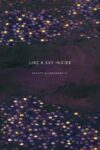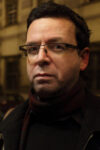The following is from the latest issue of the Full Stop Quarterly. You can purchase the issue here or subscribe at our Patreon page.
Recently, we began to talk a lot—me, you, politicians, philosophers, our colleagues, mothers, and children. We are panically looking for information and passing it on to each other, trying to apply it to the analysis of the current situation and give predictions. We turn to the experience of the past in the hopes of finding an analog of what is happening and develop reliable guidelines. In a word, we talk to bring certainty and clarity to the situation.
People tend to talk a lot when they are scared of uncertainty. We talk to fill the void of uncertainty. We are rather in a state of anxiety than the state of fear. Unlike fear, anxiety has no object. In a state of anxiety we are afraid of emptiness. Fear, in this sense, is the relief of anxiety, the former has an object and therefore relative certainty—at least we know what to be afraid of.
One can consider a human being to be essentially and inevitably an anxious being and consider anxiety to be our basic state, in which we fail when the mechanisms for suppressing anxiety cease to work. We achieve such suppression by limiting the line of sight, restraining consciousness, or resorting to the illusion of clarity about what is happening. Perhaps language itself evolved as one of the means of overcoming this initial anxiety. When entering a dialogue with others, talking about what is going on, describing reality and generating predictions, we feel that we master an unpredictable and uncontrollable reality.
In times of crisis and confusion, our need to talk grows dramatically. Although language creates the illusion of descriptive control over reality, paradoxically, language itself can increase anxiety. No matter how much we talk, words fail to heal uncertainty; they don’t fill the void, the failure of language to fulfill its therapeutic function introduces more uncertainty and only makes the emptiness more conspicuous. Anxiety might become so overwhelming that it becomes preferable to remain in complete silence.
With the current state of general perplexity and tumult, philosophy comes to the fore. It would seem that this is its finest hour. Philosophy understands and positions itself on an elevation above the banality and bias of commonsensical descriptions, the disclosure of reality hidden from our everyday sight. It seemingly offers a deeper, more subtle and innovative understanding of what is happening in the world and how and why it is happening. When the linear growth of the familiar commonsensical ways of describing and understanding the world turn out to be unsuitable for rethinking what is happening, it seems possible to find shelter in philosophical discourse. Here is the kind of speech—anchoring, direct, and consoling—that we’ve been looking for all along.
However, these days philosophy, as a shelter or as an elevated plane, is a highly questionable place to find solace. As we look to philosophers, our sense of failure only grows in intensity. Not only have attempts to fill the void with a familiar language failed, but so does philosophical insight seem to be wholly inadequate to our state of angst. The void of disturbing uncertainty has so convincingly exposed itself that even a philosophical interpretation is not able to disguise it. No less than common sense, philosophy now seems to be an empty, meaningless noise that no longer holds any sense or relevance—what Heidegger, cribbing Kierkegaard, called “chatter.”
Philosophy retains the illusion of a deeper understanding of the world because it operates with concepts that are rather detached from the world. Philosophy often does not clear our thought of biases, but rather creates its own more sophisticated biases, which cannot be refuted precisely because of their non-involvement in reality. It uses self-referential exclusive and obfuscatory language, which creates the illusion of exclusive knowledge, as if promising that something worthy and constructive is hidden behind its riddle. Because philosophy creates its own intricate reality, its therapeutic function is that it does not interpret reality, but distracts from it, luring with its own intricacy.
Today, when philosophy’s absurdity and detachment from reality has become more vividly palpable, what frightens the most is not the fact that it is not able to explain in a satisfactory manner what is happening now, but also that at the same time this casts doubt on its relevance in the past, ruining a calming illusion that philosophical theory ever actually explained anything. Given the inconsistency of the two worlds, philosophy can only weave historical events into its own interpretation, but when trying to do the reverse, that is to use philosophical discourse to analyze the present situation, everything falls apart, the inconsistency exposes itself and lets the emptiness shine through it.
One of the most talked-about cases of philosophical thought’s failure is Giorgio Agamben’s reaction to the COVID-19 pandemic. In February he strongly opposed the strict quarantine measures imposed in Italy. He acted as a philosopher, bringing his long-developed conceptual apparatus to interpret the current situation. It seemed like perfect timing to bring about his well-known and widely used conceptualization of the state of emergency and its dangers. He wrote that emergency measures for the “supposed epidemic of coronavirus,” are “frantic, irrational, and absolutely unwarranted.” Coronavirus, Agamben claimed, is “a normal flu, not much different from those that affect us every year.” For him, the real “state of exception,” and therefore the real threat, is not the disease itself. Quarantine’s measures are in his interpretation a manifestation of “the growing tendency to use the state of exception as a normal governing paradigm.”
The media interpreted Agamben’s note as “symptomatic of theory’s collapse into paranoia.”
Such an interpretation of Agamben’s position reveals a common hope behind it, that philosophy has only recently gone wrong, but in other times it worked just fine. But there are more radical conclusions one might draw from this accident, that philosophical theory never was anything else but paranoia—it has just become more noticeable recently. Previously, when there was no acute anxiety and no urgent need for explanation, this went unnoticed. We could allow ourselves to dwell in illusions.
This disappointment and anger with Agamben has also exposed us as overly relying on intellectual authorities. We are disappointed because we relied on philosophy as an authority that possesses secrets on how to generate an in-depth understanding and explanation of everything. It exposed our cheerfully futile confidence that we always have someone to rely on, that there are enlightened experts who can help us to get rid of our own paranoia by giving comprehensive sophisticated explanations of what is happening and instruction about what we are supposed to do.
Philosophers, like the rest of us, have started to talk more. Like the rest of us, they are scared and confused, maybe even more than others since they are considered to be an authority responsible for generating deep, thoughtful explanations that they continually fail to provide. Philosophers are just people, the same as each of us, they don’t understand what is happening, they are afraid, and like the rest of us use the arsenal available to them, speech, to calm down the anxiety. Like everyone else, they have nothing to say, except what they have already said many times before and what the changed situation has now rendered irrelevant.
Philosophy is just one form of therapeutic filling of the unfillable void. An attempt to grasp in the language what is not graspable. Any new human knowledge arises due to the fact that reality is not exhaustively describable or understandable in either philosophical, commonsensical, scientific, or whatever other terms we might propose. Anxiety, to which we are fundamentally doomed, is the motive for the production of knowledge and forms of describing the world. In moments of crisis, when the illusion of knowledge and the relevance of our understanding collapses, this anxiety becomes acutely felt. We talk a lot until speech turns into a crushing pointless noise that sounds like paranoia. There is no hope for a relevant explanation for any of us, but at least it means that we are together in this, desperately gathering emptiness with our words.
After the present stage of paranoiac noise, as the world is spinning out of our control, forcing us to invent endless interpretations that only trigger and maintain the panic, the next stage is collective depression, and resignation to a dreary uncertainty. This might be followed by the stage of recovery and generation of new, more convincing illusions of understanding. Until the next crisis.
Julie Reshe is a philosopher and a negative psychoanalyst of Ukrainian Gypsy origin. She is a professor at the School of Advanced Studies (SAS) at the University of Tyumen in Siberia, and director of the Institute of Psychoanalysis at the Global Center for Advanced Studies (GCAS).
This post may contain affiliate links.







